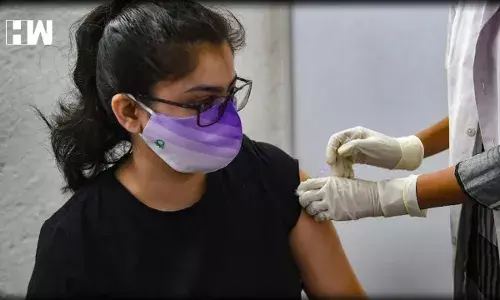New Delhi: After close to 60 per cent of the population in the 15-18 age group received first doses of Covid-19 vaccines, the pace of vaccination in this group has slowed down considerably.
In the last one week, just about 6.25 lakh people in this age group were vaccinated every day on an average, compared to over 40 lakh per day during the first week of this month, when vaccination for people below 18 years of age started. During this time, more than 4.5 crore people received their first doses. India is estimated to have between 7.5 to 8 crore people in the 15-18 age group.
The slowdown is not entirely unexpected and is largely in keeping with the trends observed for the vaccination of adults. The progress of vaccination in any population group generally goes down once the inoculation reaches the halfway mark.
However, the dip in the demand for vaccines in the 15-18 age group is much sharper than for the adult population. Part of the reason could be the lack of urgency. The Omicron variant, which is powering the current wave of infections, is not causing serious diseases, especially in the younger age group, and the vaccines have been found largely ineffective in preventing infections.
In the more vulnerable age groups, the demand for vaccines is relatively stable. About five to six lakh people are receiving booster doses every day on an average. This is not very different from three weeks ago, when the booster doses, being called “precautionary doses” in India, had been started for frontline workers and senior citizens.
There are more than 10 crore people in India over the age of 60 years and over 70 per cent of them are double-vaccinated. But not all of them are immediately eligible for the booster dose. Only those who have completed nine months after their second dose, or those with comorbidities, currently receive booster doses. Even in this group, those getting infected during the third wave have to wait for a few weeks after recovering.
As on Friday, India had administered more than 165 crore doses of Covid-19 vaccines, about 16 per cent of the number globally. According to Our World in Data project, an initiative by researchers from the University of Oxford, more than 10 billion doses of Covid-19 vaccines have been administered across the world so far. But there have been vast inequalities in the coverage of vaccination.
Over 60 per cent of the world’s population has received at least one dose of a Covid-19 vaccine. But Africa, which has 54 countries with a combined population comparable to that of India, has so far administered just about 350 million doses. That translates to about one dose for every four persons. The poorest countries in the world have together been able to give less than 100 million doses so far.
In contrast, some countries such as Israel have been offering fourth doses to their citizens. China has administered close to three billion doses of Covid vaccines. About 1.2 billion doses have been administered to people in Europe, while the United States has given close to 540 million vaccine doses till now.
Over 1 billion doses of vaccines have been delivered through Covax, a joint effort of the World Health Organisation and some other international groups to ensure affordable and equitable access to Covid-19 jabs for all.
As an independent media platform, we do not take advertisements from governments and corporate houses. It is you, our readers, who have supported us on our journey to do honest and unbiased journalism. Please contribute, so that we can continue to do the same in future.

